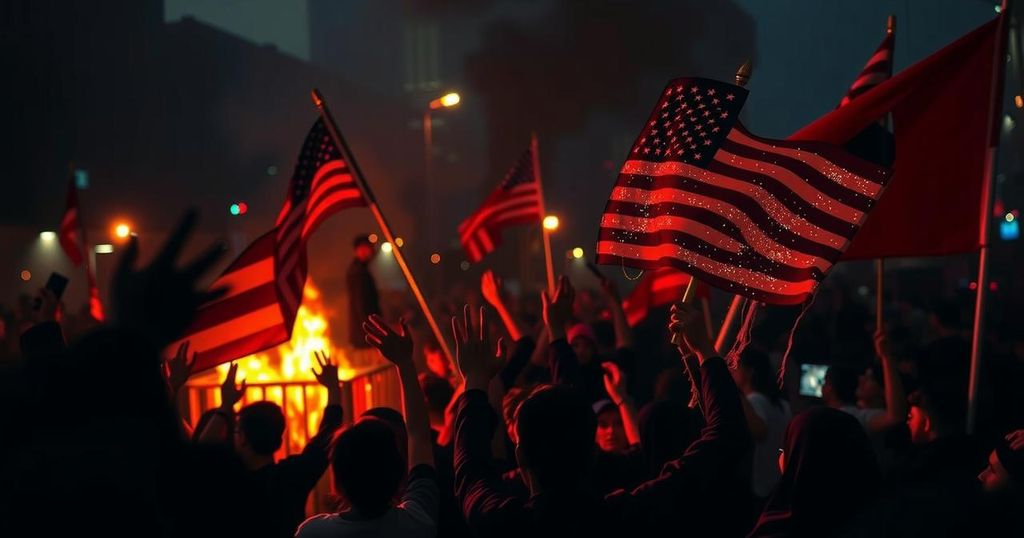Intelligence officials have warned that Russia and Iran may attempt to incite violent protests in the U.S. following the upcoming election. A declassified memo suggests that these nations might covertly organize protests or encourage participation in domestic demonstrations, aiming to deepen societal divisions and complicate the electoral process. Recent examples illustrate the lengths to which foreign entities may go to disrupt American democracy amidst growing polarization and distrust.
Intelligence officials have warned that both Russia and Iran may incite violent protests in the United States following the upcoming presidential election, which is scheduled for next month. A declassified memo released by the Office of the Director of National Intelligence outlined concerns regarding foreign interference aimed at exacerbating societal discord and undermining the electoral process. The memo details how these adversarial nations could either covertly orchestrate violent protests or stimulate participation in demonstrations organized by domestic groups. The overall goal is to deepen political divisions, raise doubts about the legitimacy of the election results, and complicate the transition of presidential power. The memo also reveals that in January, Russian military intelligence attempted to recruit an unsuspecting American citizen to assist in organizing protests, illustrating the lengths to which these foreign entities may go to disrupt domestic affairs. Iran has similarly been implicated in supporting protests in response to U.S. policies, such as those related to Israel during the Gaza conflict, with claims that individuals associated with the Iranian government offered to finance protestors’ travel expenses to events in Washington this year. Officials express heightened concern for the post-election period, given the potential for misleading claims or minor irregularities to be exploited by foreign adversaries, particularly in the wake of the January 6 Capitol riot, which demonstrated how disinformation can lead to real-world violence. Increased security measures have become necessary for election workers amid threats of election-related incidents, including the installation of bulletproof glass and panic buttons in several locations. The amplification of political violence fears stems from a broader context of rising polarization and distrust within American society, a trend that international actors seek to exacerbate through disinformation campaigns focused on elections and contentious issues like immigration and the economy. Russia has been noted to favor candidates like former President Donald Trump, who has shown a proclivity for favoring Russian President Vladimir Putin. Conversely, Iran’s disinformation and cyber efforts have targeted Trump out of retaliation for previous sanctions and military actions taken against Iranian interests during his administration. It is anticipated that Russia will actively attempt to incite protests regardless of the electoral outcome, although officials expect a more aggressive response should Kamala Harris, the Democratic candidate, prevail. In contrast, while China has also engaged in disinformation, there is no evidence suggesting it will collaborate in instigating violent protests. Past incidents of intimidation aimed at Democratic voters via hacking by Iranian operatives underscore the potential for foreign influence to suppress voter turnout through fears of violence at polling places. To combat these issues, various voting advocacy and civil rights organizations are uniting to enhance public awareness of the risks of disinformation and the importance of voter agency. Maya Wiley, President and CEO of the Leadership Conference for Civil and Human Rights, emphasized the critical nature of voter participation in the democratic process, stating, “In 2024, voters must know that they will decide the outcome of the election — not a political party, extremist groups or purveyors of disinformation.”
In preparation for the forthcoming U.S. presidential election, which is set for next month, officials have expressed significant concern about the potential for foreign interference, particularly from adversaries such as Russia and Iran. These nations have previously engaged in activities designed to sow discontent and political instability within the United States, with intelligence reports indicating they might attempt to incite violent protests following the election. The risks are amplified by a very polarized political landscape and the aftermath of the Capitol riots on January 6, 2021, which demonstrated the consequences of misleading information regarding electoral integrity. Security measures have been heightened among election workers due to increased threats of violence linked to the electoral process, as malicious influences from abroad could exploit any perceived irregularities during the critical period between the election and the inauguration.
In summary, the potential for foreign involvement in instigating protests following the upcoming U.S. presidential election raises alarm among intelligence officials. With evidence suggesting that both Russia and Iran may actively seek to induce violence or unrest, the implications for the democratic process are profound. The need for heightened security measures and an informed electorate is paramount to safeguard against disinformation and division that could undermine the election’s legitimacy.
Original Source: apnews.com






